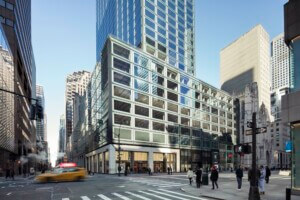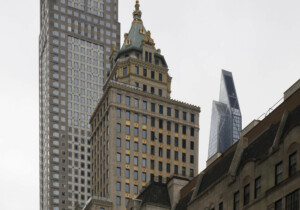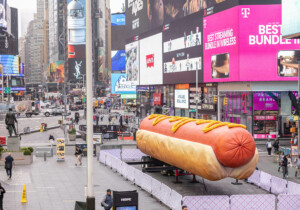Steven Holl Architects (SHA) may be on the hook for over $10 million of upgrades at Hunters Point Library if the City of New York can win a lawsuit it filed last week. In New York State Supreme Court, the city sued SHA, Steven Holl, and SHA senior partner Christopher McVoy in a suit that alleged that the firm did not comply with the Americans with Disability Act (ADA) and breached its contract with the city’s Department of Design and Construction (DDC).
The branch of the Queens Public Library, which opened in Queens’s Long Island City neighborhood in 2019, received immediate backlash over its inaccessible portions. Criticism of the $40 million project revolved around SHA’s lack of compliance with basic standards of accessibility, which the firm defended. The library’s central staircase connects to five floors of stacks, and allows visitors to take in views of the Manhattan skyline. Three of the five levels, however, are only accessible via the staircase and do not have elevator access. While the library sought compliance with the ADA by offering to have librarians retrieve books from the stacks for patrons, the inequity in this was widely called-out by other architects and visitors alike. In response to criticism, the library moved books from the inaccessible stacks to fully accessible ones, and the three levels remained empty save for its current periodicals selection.
The library opened on September 19, 2019, and within a few months, was the subject of investigations by the United States Department of Justice (DOJ) over the library’s possible violations of Title II of the ADA, the New York City Commission on Human Rights, and a lawsuit from the nonprofit Disability Rights Advocates. The partnership between SHA and the city began with a design contract in May 2007, though it was not until July 2010 that SHA was officially awarded the design.
The lawsuit alleges that in the design contract SHA entered into with the DDC, SHA agreed to “comply with all local, State and Federal laws, rules and regulations applicable to this Agreement and to the services to be performed hereunder,” including “without limitation, … the Americans With Disabilities Act.” The contract further contained a series of task orders, including one that stipulated that “All areas of the building shall provide the greatest level of accessibility as required to persons with disabilities or limited mobility, which shall include, but is not limited to, features of entrance / egress, elevators and stairs as applicable,” and that “Interior spaces are to be inviting in approach with easy access for the general public, for persons with disabilities / limited mobility and shall have natural transitions between spaces.”
The city’s lawsuit makes the case that SHA was in violation of this in regards to numerous aspects of the building’s constructed design. In addition to the much-discussed staircase, a stepped seating area in the children’s section could not be reached by wheelchair, and SHA “failed to provide required space for wheelchair and companion seating (or appropriate signage) as required by law.” On the fifth floor, the lawsuit alleges, a ramp that connected the elevator to a seating area exceeded the maximum slope legally allowed. The ramp was also the only way to access the rooftop terrace.
The city alleges that throughout the building, SHA failed to comply with basic accessibility requirements in regards to “inadequate space for wheelchair maneuverability,” in both staff and visitor bathrooms, and that “plumbing fixtures, partitions, and accessories such as grab bars, flush sensors, and diaper changing stations,” were noncompliant with accessibility regulations. Multiple ramps, including the fifth floor ramp, “fail to comply with requirements for landings, handrails, edge protection, and/or slope,” the city has alleged.
On November 7, 2019, the city notified SHA of the complaints that it had received over the building’s design, and of the ongoing investigations by the DOJ and City’s Commission on Human Rights.
Since then, the city has determined that it will cost at least $10 million to renovate the library in order to make it compliant with accessibility laws. The city’s suit against SHA hinges on the fact that the design contract held SHA liable for “‘all losses, expenses and damage caused by the failure of the Consultant properly to perform its obligations under this Agreement.’” The suit also argues that SHA must return payment it received “with respect to the noncompliant design services that SHA provided,” as SHA failed to meet contractual obligations.
The city alleges that SHA failed to correct errors during the design and construction processes, saying that: “SHA provided design documents for the Library that failed in major respects to comply with applicable legal requirements of the ADA, Section 504, the NYSHRL, and the NYCHRL and SHA failed to ascertain such errors and omissions throughout the construction phase of the Library.”
In a statement to Crain’s SHA said that “there is no wrongdoing here,” and added the firm will not comment further as they are the subject of an open lawsuit.
While the allegations against SHA detail, in the views of the city, gross negligence, it also leaves residents asking how the DDC did not raise questions earlier. The project was built through the DDC’s public-private partnership Design and Construction Excellence program, is publicly owned and operated, and was paid for by the city. It is frustrating to see public funds used inefficiently in a project that so brazenly does not serve all New Yorkers.











